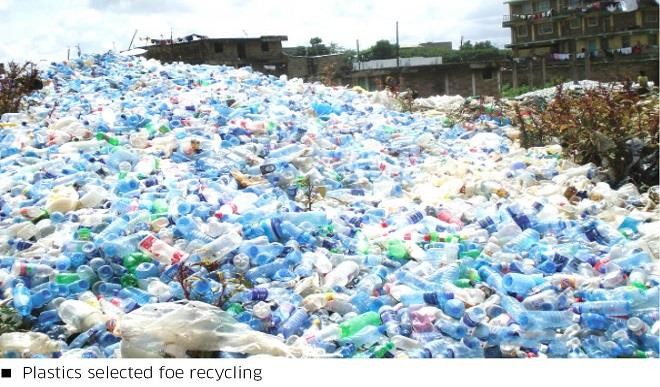
The World Economic Forum recently warned that there would be more plastic than fish in terms of weight in the world’s oceans by 2050.
It said about 280 million tonnes of plastic are produced globally each year, and only a small percentage is recycled. About 13 million tonnes of the rest ends up in the world’s oceans, costing several billion dollars per year in environmental damage to marine ecosystems.
It is, however an improvement from the 2014 report that over 5 trillion of toxic plastic garbage weighing about 269,000 tons is floating in the world’s oceans and the bits of the garbage distributed throughout the world.
It said these are a huge problem for the oceans and predicted to get worse, noting that almost 300 million tons of plastic are produced every year, and only 5 percent of the world’s plastic is recycled.
The experts forecast the volume of oceanic plastic debris will only increase due to rising production of throw away plastic, and consumers’ insatiable desire for cheap and convenient plastic goods.
The drive to recycle plastics or completely phase it out has been globally accepted for sustainable environment and as such, individuals, researchers and companies have been trying to create substitute that will have no harm to the environment.
Nigeria being a signatory to the protocol in 2014 set target to phasing out non-biodegradable plastics before the end of the year, but three years on the action of tackling the menace of non-biodegradable plastics has degenerated.
Then, in collaboration with UNIDO to phase it out, the federal government noted that plastic waste accounted for more than 20 per cent of the municipal solid waste in the country saying, that alone speaks volumes on the magnitude of the problem.
The former minister of environment, Laurencia Mallam, said the federal government had recognised that the uncontrolled use of plastic materials and indiscriminate disposal of plastic waste, particularly shopping bags and pure water sachets, are detrimental to the environment.
She said, “In an attempt to reduce the burden of plastic wastes, government is establishing recycling plants in 26 selected cities in Nigeria. The plants are expected to handle a significant volume of the plastics generated in the country.”
The fact that this recycling plants are yet to come on board, according to the then minister, means that plastic waste will continue to cause environmental hazard in the society.
“This therefore underscores the need to hasten up efforts to bring the plants on-board,” she said.
The Minister of State for Environment, Ibrahim Usman Jibril, recently disclosed that past attempts to check the menace of porous waste disposal in the country through the establishment of plastic factories and even a scrap factory in Kaduna had been scuttled as a result of vandalism of equipment mounted at the site of such factories.
Jibril, who decried the deplorable state of solid waste management in the country, said before the end of the year, the issue will be tackled frontally.
According to a statement from the ministry, the minister made the statement while delivering an address at the quarterly lecture on 35 years of Land Administration in the Federal Capital Territory (FCT), Abuja organised by the Nigerian Institution of Surveyors (FCT) in collaboration with the Federal Ministry of Environment.
He said non-degradable materials like plastic bags and bottles littering the country are a source of concern as they stay for ages without decaying and as such contribute to the pollution of the country.
While the concern over plastics in oceans continues to be raised at the global level, many have expressed fears over the harm it causes to the environment and sea animals.
The former FCT president of the Environmental Health Officers Association, Sanitarian Ajueyitsi Simon, holds the opinion that non-biodegradable plastics should be phased out completely while recyclable plastics should remain.
He said in spite of the blessings of plastics, its curses are also issues that should be addressed, adding that it caused emission of dioxins into food eaten by Nigerians because of increasing heat in the environment.
He explained that every food that is wrapped is liable to dioxins poisoning and the federal government should disqualify plastics for packaging of food.
“There are alternatives to plastics, jute bags could be used instead of plastics, then all plastics could be reduced to recyclable bottles. Because of the benefits of plastics I will not hope for complete wipe out but a reduction in the use of it,” he said.
He maintained that we cannot do away with plastics but where it is injurious to man; added to the damage of the environment, blocking of water ways and are non-degradable, we should go for bio-degradable plastics.
“When we do recycling and through re-use we will have less number going to the environment because the ones going to the environment are waste and have no use so they find their way into the stream or dump site,” he added.
While berating the poor waste management attitude in the country, he said it is not supported and that has created a setback but that it is a clarion call for the private sector to lay emphasis on waste recycling.
However, studies have shown that the concentration of toxic chemicals, such as PCB and DDT, can be up to a million times greater in plastic debris than found in seawater. These chemicals are inherently toxic, and can cause serious physiological damage in animals. And since big fish eat little fish, more organisms ingest plastic particles indirectly via their prey organisms, and concentrate the chemicals up the food chain.
Larger pieces of litter, like plastic bags, pose their own problems for seals, sea turtles, birds and other animals that ingest them.

 Join Daily Trust WhatsApp Community For Quick Access To News and Happenings Around You.
Join Daily Trust WhatsApp Community For Quick Access To News and Happenings Around You.


